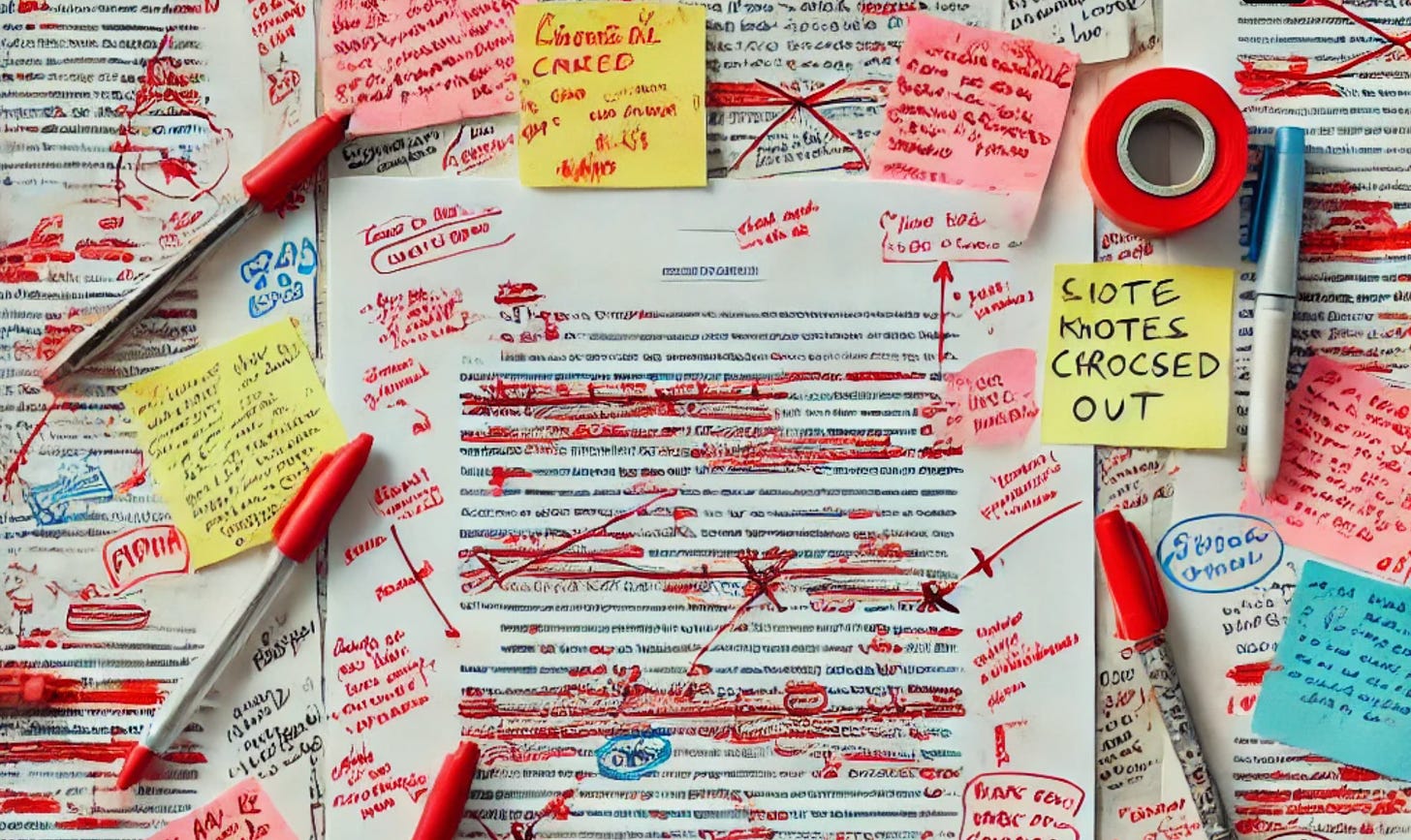When we created Google Docs, our goal was to “solve collaboration”. It turns out that this is a complicated problem, and we only got as far as step one.
At the time, back in 2005, we framed this as the “emailing a Word file back and forth” problem. When people were collaborating on a document, they had to email drafts to one another. Inevitably they’d lose track of whether the latest version was “copy of copy of Quarterly Goals v3 (2)” or “copy of Quarterly Goals v4 (Steve’s edit)”.
We didn’t know we were making Google Docs. We were just three friends, not quite literally in a Silicon Valley garage but pretty nearly1, hacking together a little web app called Writely. My co-founder Sam had clued in on the fact that GMail’s message editor allowed font / size / style formatting, which meant you could do that in a browser, which meant we could do that in a browser. And that meant we finally had a viable path for attacking the damn Word file back-and-forth problem, which had been itching at us for years.
I’ve experienced one Going Viral moment, and it came when we quietly launched our little collaborative webapp. The world decided that we were A Scrappy Startup Taking On Microsoft, which was certainly news to us, but apparently made for a good story. And then came the out-of-the-blue email from someone on Google’s corporate development team, with subject line “Greetings from Google”, which Sam very nearly discarded as spam. But that’s all a story for another time.
While we certainly didn’t anticipate how things would turn out, we did succeed in solving the Word file problem. Unfortunately, collaboration brings plenty of other challenges that we never got around to tackling. Google Docs lets collaborators edit a single document, but that leaves the problem of organizing the conversation around that document. And this disconnection between conversations and documents turns out to help explain why it’s so hard to find good information about fast-moving topics like AI.
A Gaggle of Geese, A Disorganization of Collaborators
Let’s say you’re part of a four-person team, tasked with planning a new project. The four of you have an initial discussion, and you take notes and generate a draft. Enjoy that moment: it is the last time the process will ever feel under control.
You email the team a link to your draft. Someone replies, and that sparks a long email chain discussing an alternative plan. Someone introduces a third option, which is immediately obscured by an unrelated reply; everyone forgets, and the idea is lost. Meanwhile a couple of folks have added comments in the document. You respond to those comments, but you’re not sure the rest of the group will see that, so you copy the comments and your replies into another group email. Pretty soon there are discussions taking place in multiple email chains and comment threads, the document is completely out of date, you’ve lost track of what still needs to be discussed, and one of your teammates has tuned out the entire chaotic discussion.
I’ve never seen a good solution to this problem. The “comment” feature in Google Docs (added after I left) helps, but only up to a point. In fact, sometimes it can make things worse. It’s hard to read a long discussion in the little comment window. Comments clutter the document, so eventually you ought to close them out, but first you need to update the main text to reflect the ideas from the comment, which is enough work that people often don’t bother. Comments that you haven’t closed are like broken windows, they make the document look abandoned.
Google Wave was supposed to be a miracle cure for all of these problems, but it never worked out.
Nothing ever works out.
Enter the Project Hero
In my experience, there's only one way for a collaborative project to remain organized. It requires one individual to dedicate themselves to keeping it that way.
The project hero follows up when the conversation dies down. They keep an eye out for folks who aren’t participating. They keep track of unresolved issues. They take meeting notes and update the document to reflect decisions. They make sure ideas don’t get lost.
A really good project hero also helps manage the discussion. They point out when it’s going in a circle. They identify miscommunication. They intervene when the group gets sidetracked by unimportant details (“bikeshedding”).
If that sounds like a lot of work, then you’re not getting an accurate picture. It’s an enormous amount of work.
This Is Hard Because the Process is not the Product
The fundamental problem is a mismatch between the way collaboration works and the way documents work.
The intended result of a collaborative process is a document, which lays out ideas in logical order. It’s arranged by top-level concepts, each with supporting material, surrounded by an introduction and conclusion.
The collaboration itself proceeds in temporal order. People talk about things, which spark other things. People mostly react to things someone else just said; occasionally they’ll have a new thought, which could apply to any part of the project.
The final document is intended to be read from start to finish. The collaborative discussion is intended to let participants know what new ideas have been raised. This is why the discussion usually takes place in an email thread, chat room, or live conversation, even though the final product is usually a document.
So now you have at least two separate places where people are writing things down: the document, and the discussion. Related information might reside in an open-issues list, an executive summary, or other places. All of these need to be kept in sync. And keeping differently-organized things in sync is always hard, it is one of the fundamental hard problems in knowledge work.
No Wonder Public Discourse Is So Bad
I’ve talked about my project to improve public discourse about AI. We all know that one reason the discourse is so bad is because The Algorithm2 optimizes for outrage-inducing material, rather than for quality information. But another reason is that there are precious few project heroes in the public sphere. On those occasions when constructive engagement does occur, it quickly dissipates. No one is organizing the discussion and recording settled points. No one is flagging miscommunication or repetitive discussion. No one is keeping track of open issues.
This is sad, because there is great information out there. It’s just hard to find. Every now and then I’ll be reading a comment thread in some obscure corner of the Internet, and I’ll find a little exchange that finally unlocks a thorny issue. These “aha!” moments are how we make progress. But if the ahas are buried in obscure comment threads, no one benefits3.
It’s interesting to consider Wikipedia in this light. The community of Wikipedia contributors and moderators are effectively functioning as a distributed project hero, collecting information from all across the Internet (and beyond) and carefully organizing it for easy consumption. The result is incredibly valuable. But Wikipedia, quite reasonably, does not venture into speculative or subjective topics – and discussions of the future of AI, and how we should prepare for and manage it, are nothing if not speculative or subjective.
AI Needs Project Heroes
Last time, I gave a mission statement: organize the (AI) world’s disagreements and make them universally accessible and constructive. This is a fancy way of saying “be the project hero for AI”. We don’t have great tools for organizing conversations; tools like Google Docs organize documents, not discussions. Someone needs to organize the conversation by hand, and no one is doing that for public discussions of AI. So I’m stepping up.
To begin with, I’ll be convening panels to discuss various topics around AI. Here are the first three:
Cybersecurity: What is the current equilibrium in cybersecurity? What are the limiting factors on successful attacks? (This is important missing context for the discussion of how AI might impact cybersecurity.)
Regulation: To what extent should AI risk be regulated at the level of foundation models, applications, and/or users?
Timelines: If AGI really is (as some argue) only 2-5 years away, what is the path that’s going to get us there? What can we watch for in the next 12 months that will tell us whether we really are on that path?
Facilitating these conversations and then turning them into accessible reports will be a lot of work, but sometimes the secret is to embrace the grind.
Over time we’ll look for ways to make this more scalable. But I’m planning for it to continue to be labor intensive. Solving the collaboration problem may be a lot harder than it was to build Writely. After all, Writely’s 20th anniversary is coming next year, and collaboration hasn’t changed much in the interim4.
Thanks to James Cham for pointing out the connection between Writely / Google Docs and the problem of productive discussion, and to Roy Bahat for contributing ideas.
It was an attic space above my carport.
I.e. the algorithms that influence what material you see on social media and other online platforms, as well as the algorithms in our heads that determine who we follow and what we read.
Thanks to Roy Bahat for the ideas in this paragraph.
To be fair, there are many tools, websites, and communities that have interesting takes on the collaboration problem. Wikipedia, LessWrong, pol.is, and Arbital, to name just a few. There are also newer products like Notion that provide a nice clean implementation of shared-documents-with-comments and add lots of additional features. Notion is my daily driver now! But I haven’t seen anything that really solves the problems I’m describing here in a clean and general way.




What if agentic AI can soon *become* the "Project Hero"? 🤔 (at the very least in terms of keeping things in sync and updated, and summarizing what humans still need to contribute) Obviously there is risk and the need to earn trust, which might be a difficult problem to overcome for serious tests, much less full deployment. But it seems increasingly possible within the next 6-12 months, no?
Such a good point about how the comments get lost and overwhelming while editing in a tool we love! I look forward to learning about your 3 beginning topics.